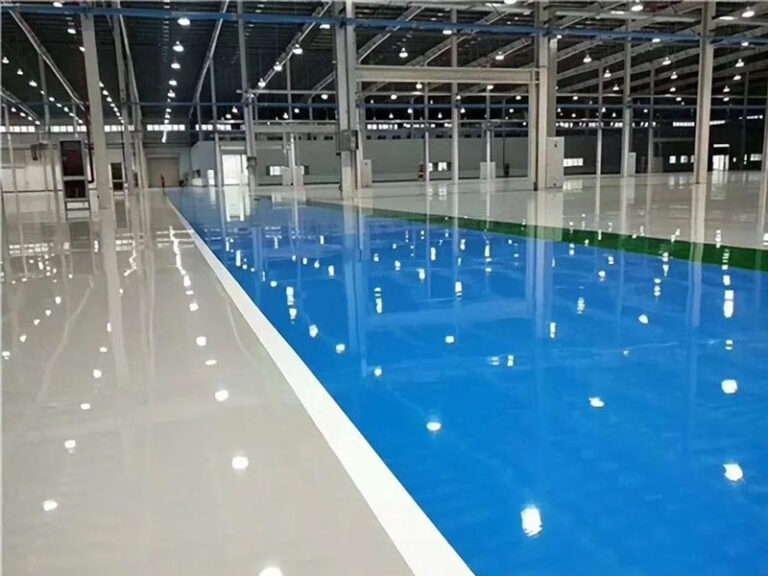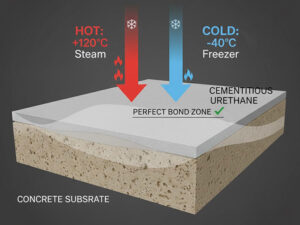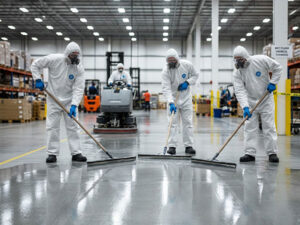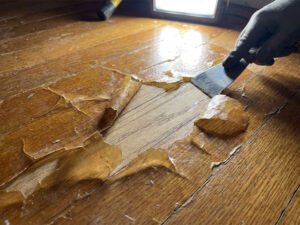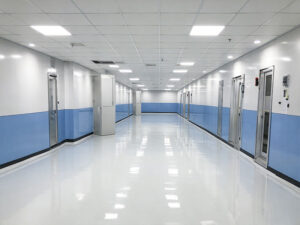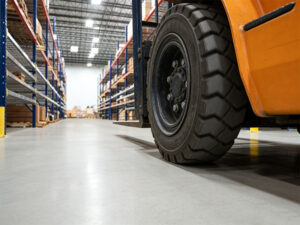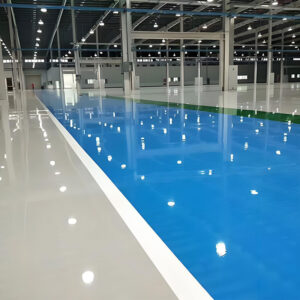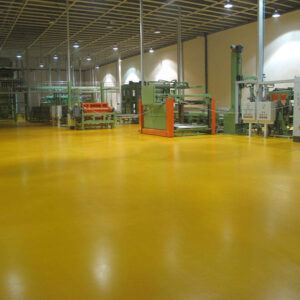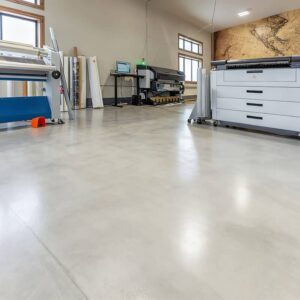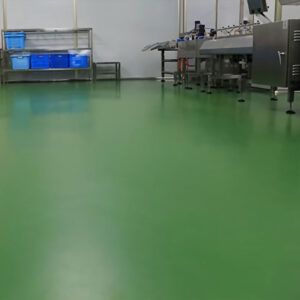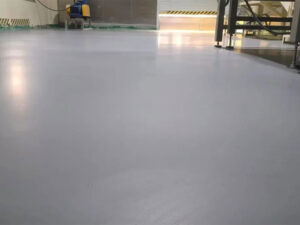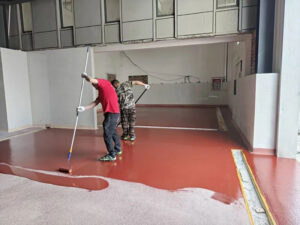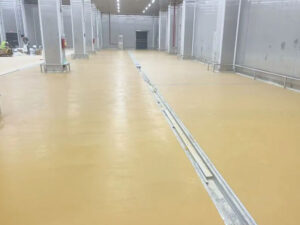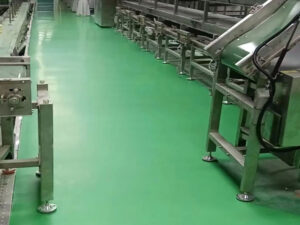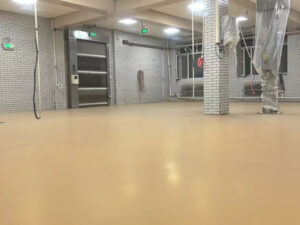Pendahuluan
Lantai epoksi adalah pilihan populer untuk garasi, gudang, pabrik, dan ruang komersial karena daya tahan, ketahanan terhadap bahan kimia, dan hasil akhir yang ramping. Namun, satu pertanyaan kritis sering muncul: "Seberapa tebal lantai epoksi seharusnya?"
Ketebalan lantai epoksi Anda secara langsung berdampak pada masa pakai, kapasitas menahan beban, dan ketahanannya terhadap keausan. Terlalu tipis, dan mungkin akan mengelupas atau pecah. Terlalu tebal, dan bisa retak atau menjadi mahal.
Panduan ini akan membahasnya:
✔ Ketebalan lantai epoksi yang direkomendasikan untuk aplikasi yang berbeda.
✔ Faktor-faktor yang mempengaruhi ketebalan epoksi (lalu lintas, bahan kimia, kondisi permukaan).
✔ Risiko epoksi yang terlalu tipis atau terlalu tebal.
✔ Bagaimana memilih ketebalan yang tepat untuk proyek Anda.
1. Bagaimana Cara Mengukur Ketebalan Lantai Epoksi?
Ketebalan lantai epoksi biasanya diukur dalam mil (1 mil = 0,001 inci) atau milimeter (mm).
- Lapisan epoksi tipis (2-4 mils / 0,05-0,1 mm) - Digunakan untuk area dengan tugas ringan (misalnya, ruang penyimpanan perumahan).
- Lapisan epoksi standar (8-20 mils / 0,2-0,5 mm) - Ideal untuk sebagian besar rumah dan ruang komersial.
- Sistem epoksi tebal (20-100+ mils / 0,5-2,5 mm) - Diperlukan untuk lantai industri dengan mesin berat.
Mengapa Ketebalan Epoksi Penting?
✅ Daya tahan - Epoksi yang lebih tebal tahan terhadap goresan, benturan, dan abrasi.
✅ Ketahanan kimiawi - Lapisan yang tebal lebih tahan terhadap minyak, asam, dan pelarut.
✅ Umur panjang - Epoksi yang diaplikasikan dengan benar akan bertahan lama 10-20 tahunsementara lapisan tipis dapat terdegradasi dalam 3-5 tahun.
2. Ketebalan Lantai Epoksi yang Direkomendasikan untuk Berbagai Aplikasi
(1) Lantai Epoksi Perumahan (Garasi, Ruang Bawah Tanah, Bengkel)
- Ketebalan yang disarankan: 8-12 mil (0,2-0,3 mm)
- Terbaik untuk:
- Parkir mobil (sedan, SUV).
- Ruang kerja DIY.
- Area yang membutuhkan kedap debu dan mudah dibersihkan.
- Pilihan anggaran: 4-8 mil (kurang tahan lama tetapi lebih murah).
(2) Lantai Epoksi Komersial & Industri Ringan (Ruang Pamer, Toko Mobil, Restoran)
- Ketebalan yang disarankan: 12-20 mil (0,3-0,5 mm)
- Terbaik untuk:
- Lalu lintas pejalan kaki sedang (toko ritel, pusat kebugaran).
- Bengkel mobil (ketahanan terhadap minyak dan bahan kimia).
- Area pemrosesan makanan (tahan air & deterjen).
- Tambahkan agregat anti selip (pasir kuarsa) untuk keamanan.
(3) Lantai Epoksi Industri Tugas Berat (Pabrik, Gudang, Pusat Logistik)
- Ketebalan yang disarankan: 20-100+ mil (0,5-2,5 mm)
- Terbaik untuk:
- Forklift, alat berat.
- Area penyimpanan bahan kimia (asam, pelarut).
- Ruang pembeku atau zona panas tinggi.
- Mortar epoksi yang dapat meratakan sendiri (3-6 mm) mungkin diperlukan untuk daya tahan yang ekstrem.
(4) Lantai Epoksi Dekoratif (Logam, Serpihan, Terrazzo)
- Ketebalan yang disarankan: 10-30 mil (0,25-0,75 mm)
- Terbaik untuk:
- Hotel, kantor, ruang pamer (daya tarik estetika yang tinggi).
- Desain khusus (kepingan berwarna, pola).
- Beberapa lapisan (primer + lapisan dasar + lapisan atas) sering digunakan.
3. Faktor Utama yang Mempengaruhi Ketebalan Lantai Epoksi
(1) Kondisi Substrat
- Beton baru: Biasanya dapat menggunakan 8-12 mil dari epoksi.
- Beton tua atau rusak: Mungkin memerlukan 20+ mil atau mortar epoksi untuk daya rekat yang tepat.
(2) Lalu Lintas & Beban
- Lalu lintas pejalan kaki & kendaraan ringan: 8-12 mil sudah cukup.
- Alat berat & forklift: 20-100+ mil dengan penguat serat.
(3) Paparan Bahan Kimia
- Minyak, lemak, asam: Epoksi yang lebih tebal (atau lapisan atas poliuretan) memberikan perlindungan yang lebih baik.
(4) Umur yang diharapkan
- Jangka pendek (di bawah 5 tahun): 4-8 mil mungkin bisa digunakan.
- Jangka panjang (10+ tahun): 12-30 mil dengan perawatan yang tepat.
4. Risiko Lantai Epoxy yang Terlalu Tipis atau Terlalu Tebal
(1) Risiko Epoksi Terlalu Tipis (<8 mil)
❌ Mengupas & mengupas - Lemah terhadap abrasi.
❌ Daya rekat yang buruk - Dapat mengelupas dari beton.
❌ Kerusakan kimiawi - Tumpahan dapat menembus lapisan.
(2) Risiko Epoksi Terlalu Tebal (>100 mil Tanpa Penguatan)
❌ Retak - Ketebalan yang berlebihan dapat menyebabkan fraktur tegangan.
❌ Biaya lebih tinggi - Lebih banyak material dan tenaga kerja yang dibutuhkan.
❌ Menyembuhkan masalah - Lapisan yang dalam mungkin tidak mengering dengan baik.
5. Bagaimana Cara Memastikan Ketebalan Lantai Epoxy yang Tepat?
(1) Konsultasikan dengan Pemasang Profesional
- Para ahli menilai kebutuhan Anda dan merekomendasikan ketebalan terbaik.
(2) Periksa Substrat Beton
- Periksa apakah ada retakan, kelembapan, dan kerataan sebelum mengaplikasikannya.
(3) Pilih Sistem Epoksi yang Tepat
- Epoksi film tipis - Untuk penggunaan tugas ringan.
- Epoksi yang meratakan sendiri - Untuk hasil akhir yang halus dan berkilau.
- Mortar epoksi - Untuk lantai industri yang berat.
(4) Pertimbangkan Mantel Pelindung
- Lapisan atas poliuretan (10-20 mil) menambahkan ketahanan terhadap UV dan daya tahan ekstra.
6. Kesimpulan: Berapa Ketebalan Lantai Epoksi Terbaik?
Ketebalan lantai epoksi yang ideal tergantung pada penggunaan, lingkungan, dan anggaran:
- Tempat tinggal (garasi, ruang bawah tanah): 8-12 mil
- Komersial (ruang pamer, toko mobil): 12-20 mil
- Industri (pabrik, gudang): 20-100+ mil
- Dekoratif (kantor, ritel): 10-30 mil
Kiat Pro: Selalu konsultasikan dengan spesialis lantai epoksi untuk mengevaluasi lantai Anda dan merekomendasikan solusi terbaik.
